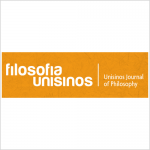A dialogical frame for fictions as hypothetical objects
Vol 16, No 1 (2015) • Filosofia Unisinos - Unisinos Journal of Philosophy
Autor: Shahid Rahman, Juan Redmond
Resumo:
Recent work on the development of a dialogical approach to the logic of fiction stresses the notion of existence as choice. Moreover, this approach to existence has been combined with the notion of ontological dependence as deployed by A. Thomasson’s artifactual theory of fiction. In order to implement such a combination within the dialogical frame several predicates of ontological dependence have been defined. However, the definition of such predicates seems to lean on a model-theoretic semantics for modal logic after all. The main aim of the present paper is to set a dialogical frame for the study of fictions in the context of the dialogical approach of CTT recently developed by S. Rahman and N. Clerbout where a fully-interpreted language is unfolded. We will herewith develop the idea that in such a setting fictional entities are understood as hypothetical objects, that is, objects (functions) the existence of which is dependent upon one or more hypotheses that restrict the scope of choices available. We will finish the paper by suggesting that this provides both a natural and genuinely dialogical way to understand R. Frigg’s take on scientific models as fictions and a new perspective on Thomasson’s notion of generic ontological dependence.
ISSN: ISSN: 1984-8234
Texto Completo: http://revistas.unisinos.br/index.php/filosofia/article/view/fsu.2015.161.01
Palavras-Chave: dialogical logic,hypothetical objects,scienti

Filosofia Unisinos - Unisinos Journal of Philosophy
The journal Filosofia Unisinos - Unisinos Journal of Philosophy is published once every four months by Universidade do Vale do Rio dos Sinos.
Articles must be original, unpublished, and not under consideration for publication anywhere else and can be written in Portuguese, English or Spanish
Filosofia Unisinos - Unisinos Journal of Philosophy prints articles, translations and critical book reviews. It also reprints papers that are considered fundamental to the area when authorized written permission is given by the original publisher.
